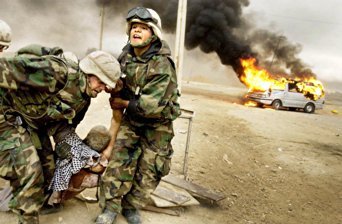Iraq mayhem triggers hunt for exit strategy in US and UK
 Frantic efforts have started in Washington and London to find an exit strategy from Iraq as 800 gunmen, thought to be part of the Mahdi army militia, ran amok in Amara, a town transferred by the British to Iraqi control two months ago.
Frantic efforts have started in Washington and London to find an exit strategy from Iraq as 800 gunmen, thought to be part of the Mahdi army militia, ran amok in Amara, a town transferred by the British to Iraqi control two months ago.
74 American soldiers have already died in Iraq this month, meaning it is likely to be the worst month for US casualties for two years. Pressure is also building for a change in US tactics because of the leaked report from James Baker and the Iraq Study Group, a group set up at Mr Bush's request to explore the US's options in the troubled region.
The British Foreign Office are also said to be "beavering away" on about half a dozen options, roughly the same as those considered by the ISG. One official said discussions were proceeding at "a high tempo".A source in the Amara police department said 30 officers and 20 civilians had been killed when the gunmen overran police stations and set up roadblocks. About 500 British soldiers were last night on standby to go back in.
In Washington, Mr Bush said he would consult his top military commanders in Iraq today over whether a change of tactics was necessary. But the president, who is under intense pressure to rethink his Iraq strategy if not his whole approach to foreign policy, said talks with the generals would only concern tactics, not strategy. "We are constantly adjusting tactics so we can achieve our objectives and right now, it's tough," the president admitted to the Associated Press.
High amongst the options being considered by the FO are the opening of talks with Syria and Iran, the two country's that the White House has sought to isolate.
It is astonishing that three long years into a conflict that has cost so many lives that the US and the Brits are still flailing around searching for a policy. This is a direct result of the neo-con arrogant belief that US power would always be triumphant and Donald Rumsfeld's arrogant dismissal of all previous warnings that the war was not going well."The failure of the Baghdad initiative is convincing evidence that a military solution is not going to work," said Larry Diamond, a former adviser to the US-led occupation authority in Baghdad who also advised the ISG. "We should be talking to neighbouring Arab states and we think we should be talking to Iran - to broker the compromises which might save the situation," Mr Diamond told the Guardian.
Other options being considered are a redeployment of forces to "super-bases" in Iraq or bases outside the country, pressuring the Baghdad government to find a fairer way of sharing Iraq's oil wealth to give Sunnis a better deal, and even the partitioning of the country into autonomous Kurdish, Sunni and Shia regions - an idea the White House has dismissed as a "non-starter".
British diplomats, including Dominic Asquith, the ambassador to Iraq, and Sir David Manning, ambassador to Washington, have contributed to the ISG.
The Foreign Office is backing the ISG proposal to engage with Iran and Syria. "We are encouraging them to go with that," a Foreign Office source said.
The Foreign Office has ruled out an immediate unilateral British pull-out and partition. It basically favours a continuation of the present policy, but is agonising over whether to press for a timetable, possibly even a secret one, for withdrawal. "Every policy option I could lay out for you would be worse than what we are doing now," a British official said.
I also notice that certain options are being dismissed, not because they are impractical, but because George Bush is now conducting US policy solely on the basis that he must not be allowed to ever be seen to have lost face.
Even the British Foreign Office are now pleading for negotiations to be opened with Iran and Syria, but I have no great hope that the US will explore this option. Cheney simply would not allow it I suspect.
The problem for the neo-cons is that they are searching for a way out that does not look like an American defeat. At this stage in the game I do not think such an exit strategy realistically exists.
Time will tell as to what Bush decides, but after three years of "staying the course" I wouldn't be surprised if he attempts to stick to his guns and see this out, handing the whole mess over to his successor.
The Republican party would need to actually learn to voice it's concerns loudly before this administration is going to change course. And so far, even the supposedly "brave" Republican minority have avoided rocking the boat in any meaningful sense.
Click title for full article.
tag: Bush, Republican, Party, Iraq, Iraq war, casualties, rising, "Stay the course", troops, should, withdraw, withdrawal, British plans,























No comments:
Post a Comment